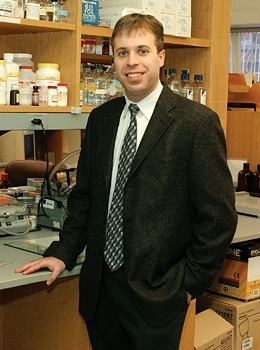BUSM Researchers Present at the American Association of Cancer Research Annual Meeting
Anurag Singh, PhD, assistant professor in the Department of Pharmacology and Experimental Therapeutics at BUSM, along with Dr. Avrum Spira, associate professor of medicine, pathology and laboratory medicine, recently presented their work at the American Association of Cancer Research Annual Meeting in Chicago. Singh’s seminar, on targeted therapeutics for colon cancer was featured in the “Late-Breaking Abstracts Mini-Symposium”. Spira’s presentation was on personalized genomic approaches for preventing lung cancer.
 Anurag Singh
Anurag Singh
Over one million cases of colon cancer are diagnosed worldwide each year resulting in approximately 600,000 deaths annually. Disease-causing mutations in the KRAS gene are found in over half of these cases. In the United States, colon cancer patients are routinely genotyped for KRAS gene mutations and those with mutations are excluded from receiving novel “targeted” therapeutic agents due to a lack of clinical benefit. Thus, patients with KRAS gene mutations are faced with very limited therapeutic options and are subsequently given very poor clinical prognoses.
 Avrum Spira
Avrum Spira
Singh and his colleagues have identified a network of genes that are hyper-activated in KRAS mutant colon cancers. Within this network is a gene called MAP3K7 or TAK1, which plays a very critical role in promoting colon cancer disease progression. Pharmacological inhibition of TAK1 results in strong killing of affected tumor cells, with minimal effects in “normal” non-mutated cells. “These findings raise the possibility that anti-TAK1 agents could provide the basis for “personalized” medicine in patients with highly aggressive KRAS mutant colon cancers,” said Singh. Efforts are now underway to identify clinically efficacious TAK1 inhibitors.
Spira, who also directs the Translational Bioinformatics core within BU’s Clinical and Translational Science Institute, discussed his recent work profiling gene-expression in the bronchial airway epithelium as a tool for identifying those smokers who are at highest risk for developing lung cancer, and using this information to guide therapeutic strategies for reversing these genomic alterations and potentially reducing risk for lung cancer development.
View all posts